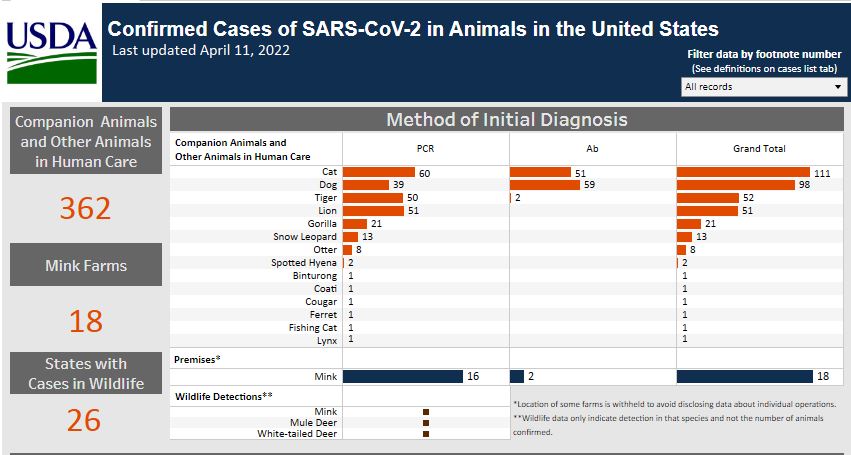While the overwhelming focus of the COVID-19 pandemic has been on the effect that the virus has had on humankind, there have been documented cases of the SARS-CoV-2 virus infecting animals. The U.S. Department of Agriculture’s Animal and Plant Health Inspection Service (APHIS) tracks the incidence of the the virus in animals in the U.S. That analysis continues to show that infection in animals is quite small.
The APHIS website most recently updated its data collection on this subject on April 11:
Source: APHIS website.
As can be seen, there have only been 362 confirmed cases of SARS-CoV-2 virus in the U.S. among companion and other animals and 18 cases on mink farms. Moreover, there have been some confirmed cases among free-ranging (wild) animals, including mink, mule deer and white-tailed deer. This, of course, stands in sharp contrast to the spread of the virus among humans in the U.S. According to Johns Hopkins University Medicine, to date there have been 80,518,989 confirmed cases of COVID-19 among humans in the U.S. with 987,343 deaths.
In compiling this information on the spread of the disease among animals, APHIS has stressed the following points:
-
- The risk of animals spreading SARS-CoV-2, the virus that causes COVID-19, to people is low.
- The virus can spread from people to animals during close contact.
- More studies are needed to understand if and how different animals could be affected by COVID-19.
- People with suspected or confirmed COVID-19 should avoid contact with animals, including pets, livestock, and wildlife.
When it comes to COVID-19 and pets, the Centers for Disease Control have also stressed the largely de minimis effect that the virus has had among animals:
-
- The virus that causes COVID-19 can spread from people to animals during close contact.
- The risk of animals spreading COVID-19 to people is low.
- Pets can get serious illness from infection with the virus that causes COVID-19, but this is extremely rare.
APHIS compiles and makes available current scientific studies and other publications on the subject of SARS-CoV-2 in animals. Two recent items are of particular interest with respect to the incidence of the virus in free-ranging animals.
A study by APHIS scientists published in October 2021 focused on SARS-CoV-2 in white-tailed deer (Odocoileus virginianus). Serum samples taken from white-tailed deer as part of wildlife management activities in four states indicated that 40% of the samples in 2021 were positive for the SARS-CoV-2 antibody which indicated exposure to the virus. The authors noted several activities that might bring deer into direct contact with people and therefore result in exposure: “captive cervid operations, field research, conservation work, wildlife tourism, wildlife rehabilitation, supplemental feeding, and hunting.” The authors also noted that this potential for “[r]everse zoonoses poses significant risks to both human and animal health” particularly as it concerns animals like white-tailed deer that “are both abundant and live in close association with humans.”
The second study was published in January 2022, by authors from APHIS, Colorado State University and the University of Queensland (Australia). This study concerned the potential for the infection of red fox (Vulpes vulpes) and coyotes (Canis latrans) with SARS-CoV-2. These species were of interest because the experience of domestic dogs being infected with the virus suggested that other members of the canid family might also be susceptible. In addition, the red fox and coyote are “widely distributed” and and have become “particularly adapted to urban environments.” Based upon challenges of captive-bred red fox and coyote specimens with the virus, the authors concluded that the red fox are “highly susceptible to infection with SARS-CoV-2” but that “coyotes appear to not be susceptible to infection with SARS-CoV-2,” and therefore “are unlikely to be competent hosts for SARS-CoV-2.” The authors also observed, however, that the red fox only showed “mild clinical disease” which was consistent with what has been reported before on other animal infections: “In the vast majority of cases, non-human animals seem to experience subclinical or mild disease following infection with SARS-CoV-2.”

